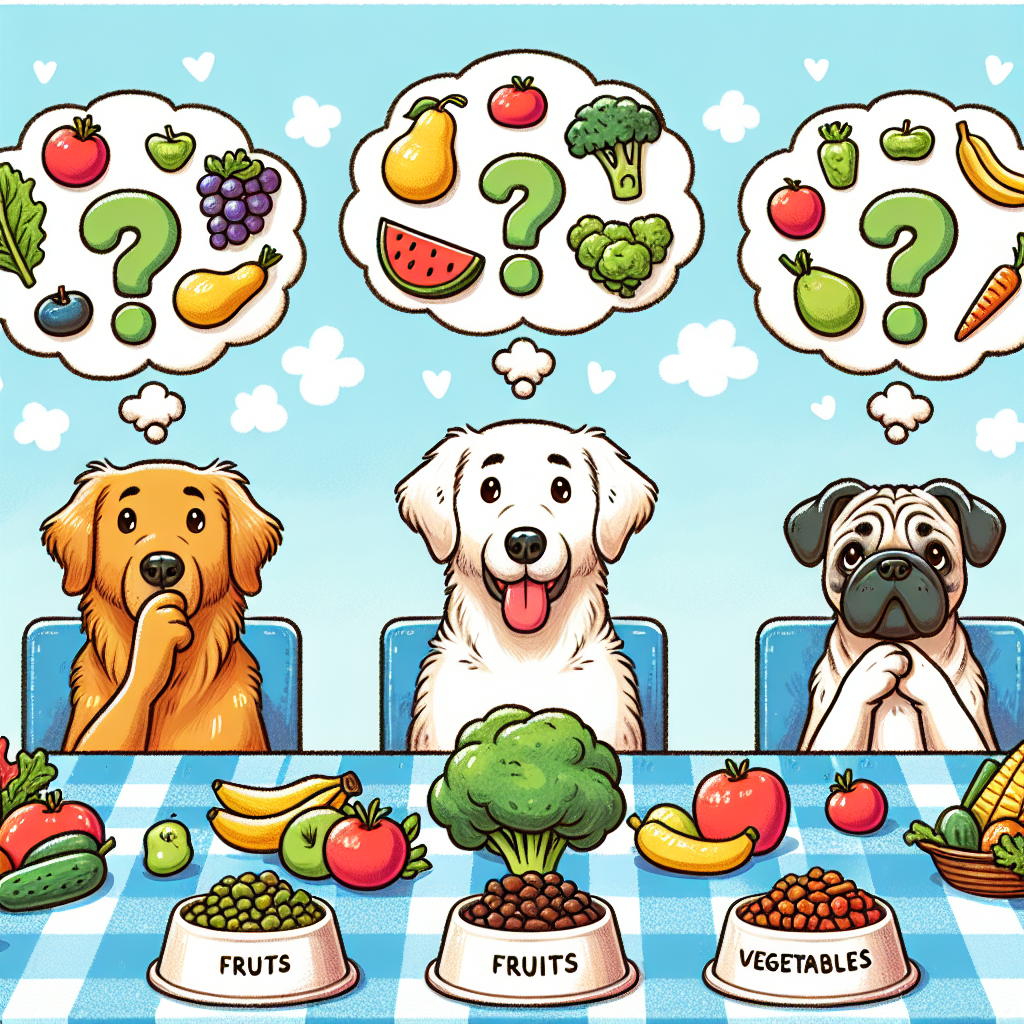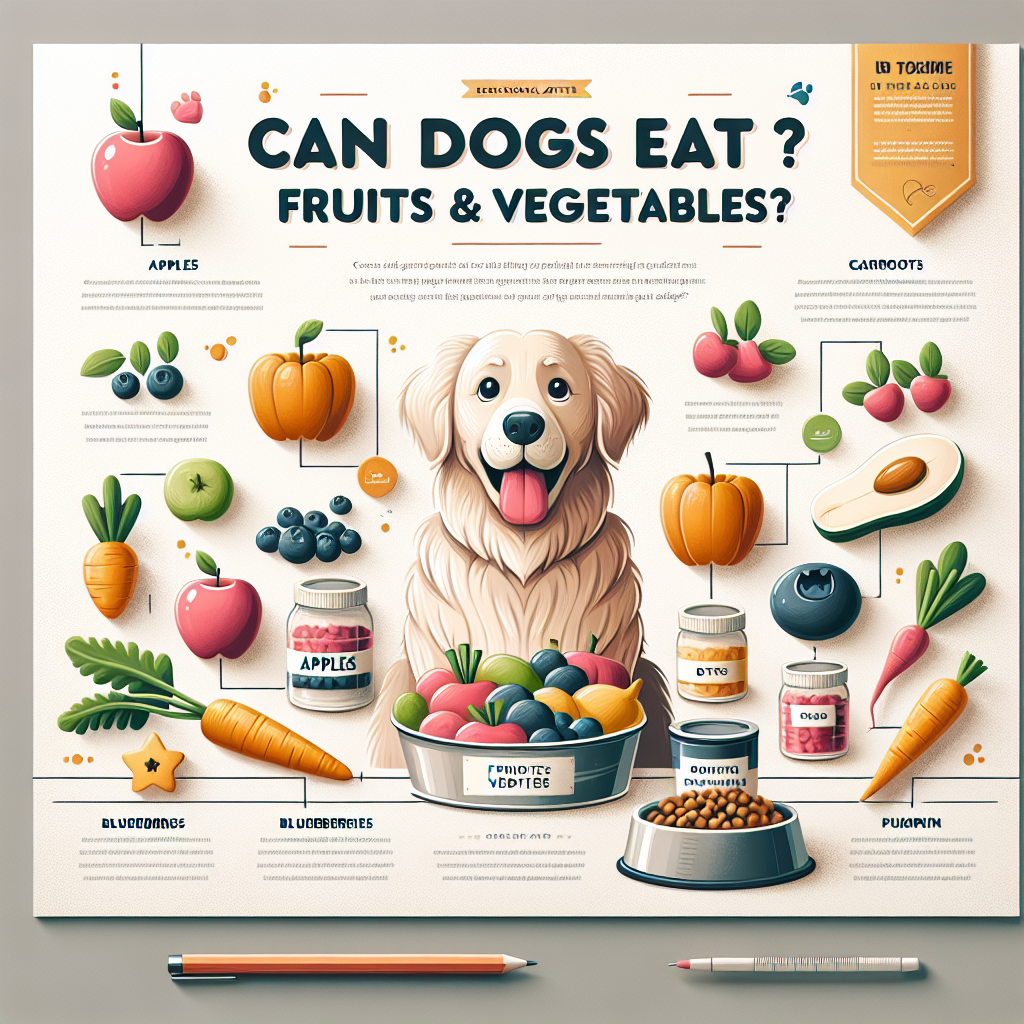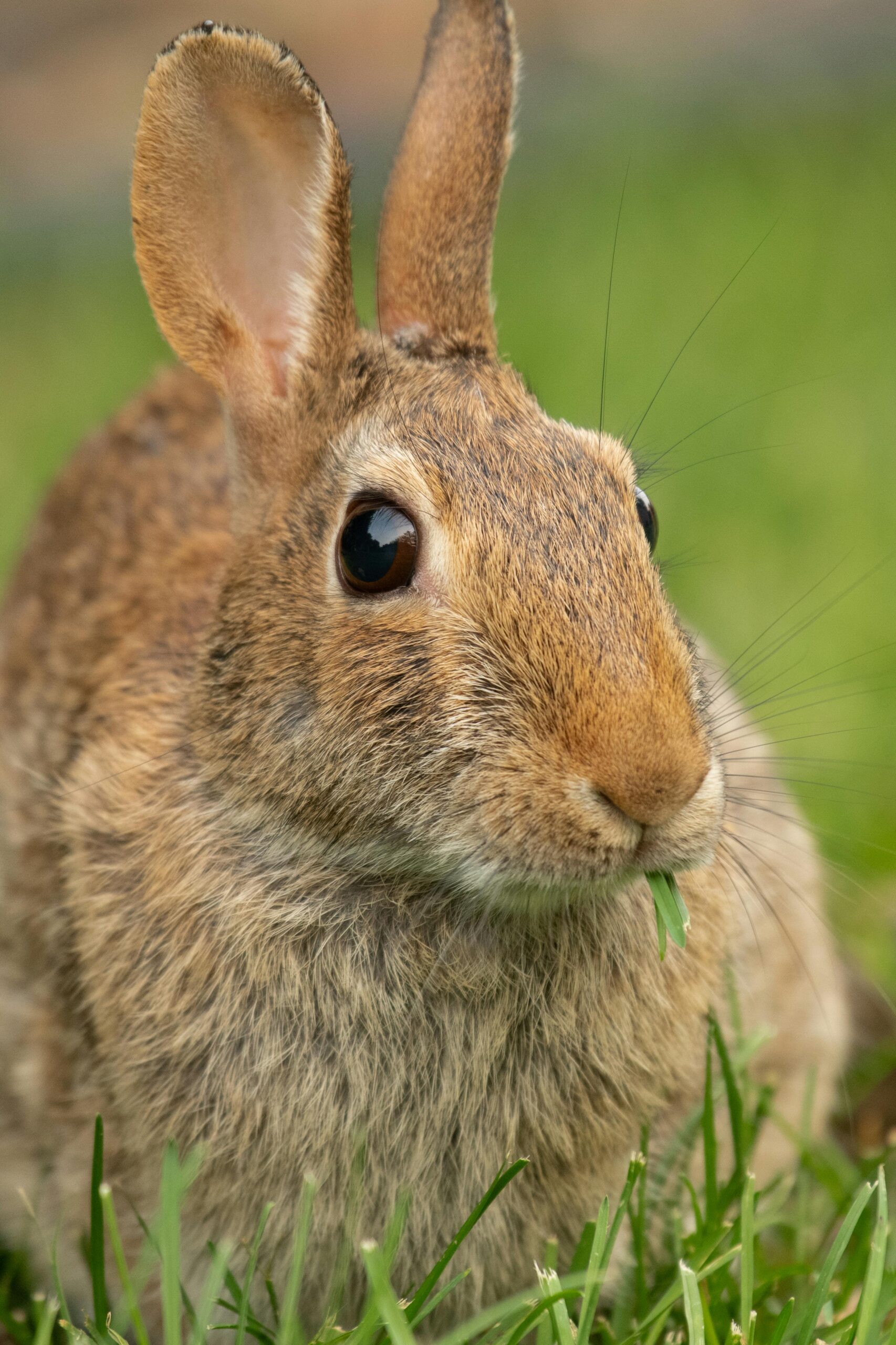Are you curious about whether or not dogs can eat fruits and vegetables? Well, you’ve come to the right place! Many dog owners are often unsure about what types of foods are safe for their furry companions to consume. In this article, we will explore the topic of dogs and their dietary preferences, specifically focusing on the question of whether or not they can enjoy the same healthy snacks we do. So, grab a snack yourself and let’s find out if dogs can eat fruits and vegetables! Yes, they can! In fact, feeding fruits and vegetables to dogs can have many benefits for their overall health and well-being. Not only do these natural foods provide essential nutrients, but they also improve digestive health, boost the immune system, support weight management, and promote dental health. However, it’s important to know which fruits and vegetables are safe for dogs to consume and how to properly prepare them. In this article, we will explore the benefits of feeding fruits and vegetables to dogs, as well as provide a list of safe options and tips for incorporating them into your dog’s diet.
Benefits of Feeding Fruits and Vegetables to Dogs
Provide Essential Nutrients
Just like humans, dogs require a balanced diet that includes essential nutrients to thrive. Fruits and vegetables can contribute to this by providing vitamins, minerals, and antioxidants that are important for their overall health. For example, fruits like apples, bananas, blueberries, strawberries, and watermelon are rich in various vitamins and antioxidants that help support a healthy immune system, improve eyesight, and promote a healthy coat. Vegetables such as carrots, cucumbers, green beans, sweet potatoes, and pumpkin are packed with vitamins A, C, and K, as well as dietary fiber, which aids in digestion and supports a healthy weight.
Improve Digestive Health
Feeding fruits and vegetables can have a positive impact on your dog’s digestive system. Many fruits and vegetables are high in fiber, which helps regulate bowel movements and prevents constipation. Additionally, the natural enzymes found in certain fruits and vegetables can aid in the breakdown and absorption of nutrients, promoting better digestion overall. By incorporating these foods into your dog’s diet, you can help maintain a healthy and regular digestive system.
Boost Immune System
Fruits and vegetables are not only a great source of essential nutrients but also contain antioxidants that can help boost your dog’s immune system. Antioxidants help neutralize harmful free radicals in the body, reducing the risk of oxidative damage to cells and tissues. Including fruits and vegetables such as blueberries, strawberries, and sweet potatoes in your dog’s diet can provide an added boost of antioxidants, helping to strengthen their immune system and protect against diseases and infections.
Support Weight Management
Maintaining a healthy weight is crucial for your dog’s overall health and longevity. Fruits and vegetables can contribute to weight management by providing essential nutrients while being low in calories. These foods can be used as healthy alternatives to high-calorie treats or incorporated into your dog’s regular meals to add bulk without adding excessive calories. For example, carrots and green beans can make great low-calorie snacks that are also high in fiber, helping your dog feel full and satisfied while maintaining a healthy weight.
Promote Dental Health
Chewing on certain fruits and vegetables can help promote dental health in dogs. The mechanical action of biting and chewing on these foods can help remove plaque and tartar buildup, reducing the risk of dental diseases such as gum inflammation and tooth decay. Additionally, some fruits and vegetables, like apples and carrots, have a natural crunchiness that can help strengthen your dog’s teeth and gums. Including these foods as part of your dog’s diet can contribute to their overall dental hygiene and prevent oral health issues.
Safe Fruits for Dogs
While many fruits are safe for dogs to consume, it’s important to be aware of which ones are safe and which ones should be avoided. Here are some safe options that you can introduce to your dog’s diet:
Apples
Apples are a great fruit to share with your furry friend. They are rich in dietary fiber, vitamin C, and vitamin A, which can help support healthy digestion and boost the immune system. However, it’s important to remove the core and seeds as they can be a choking hazard and contain traces of cyanide.
Bananas
Bananas are another safe and nutritious fruit for dogs. They are a good source of potassium, vitamin C, and vitamin B6. Bananas can be given as a treat or mashed and mixed with your dog’s regular food. Just make sure to remove any peels before feeding them to your dog.
Blueberries
Blueberries are packed with antioxidants and can provide numerous health benefits for dogs. These small and delicious berries are rich in vitamins C and K, as well as fiber. You can serve blueberries as a standalone treat, mix them with your dog’s food, or even freeze them for a refreshing snack during hot summer months.
Strawberries
Strawberries are not only sweet and tasty but also a fantastic source of vitamins and antioxidants for your dog. They contain vitamin C, vitamin K, and dietary fiber. Like other fruits, it’s important to wash strawberries thoroughly and remove the stem before feeding them to your dog.
Watermelon
Watermelon can be a hydrating and refreshing fruit for dogs, especially during the summer months. It is primarily composed of water and is low in calories, making it a safe and healthy treat. Be sure to remove any seeds and rind before offering watermelon to your dog.

Recommended Vegetables for Dogs
In addition to fruits, vegetables are also a valuable addition to your dog’s diet. These nutrient-packed foods can provide various health benefits while adding fiber and essential vitamins to their meals. Here are some recommended vegetables that are safe for dogs:
Carrots
Carrots are a go-to vegetable for many dog owners. They are rich in beta-carotene, vitamin A, and dietary fiber. The crunchy texture of carrots can also help promote dental health by removing plaque and tartar buildup. You can serve carrots raw as a snack or cooked as part of your dog’s meal.
Cucumbers
Cucumbers are low in calories and a good source of hydration for dogs. They are rich in vitamins K and C, as well as dietary fiber. Sliced cucumbers can be a refreshing and crunchy treat for your dog on a hot day. Just make sure to remove the skin and any seeds before feeding them to your furry friend.
Green Beans
Green beans are a nutritious vegetable that can provide dogs with vitamins A, C, and K, as well as dietary fiber. They are low in calories and can be served cooked or raw. Green beans can be a great option for dogs that need to lose weight or maintain a healthy weight.
Sweet Potatoes
Sweet potatoes are a nutritious and tasty vegetable that dogs can enjoy. They are rich in beta-carotene, vitamins A and C, and dietary fiber. Sweet potatoes can be boiled, mashed, or even baked and then served as a side dish or mixed with your dog’s regular food.
Pumpkin
Pumpkin is not only a popular ingredient for seasonal recipes but also a beneficial food for dogs. It is high in fiber, which can aid in digestion and help regulate bowel movements. Pumpkin can be served cooked or canned, but make sure to choose plain pumpkin without any added spices or sugar.
Fruits and Vegetables to Avoid
While many fruits and vegetables are safe for dogs, there are some that should be avoided as they can be toxic or harmful to their health. Here are some fruits and vegetables that you should not feed to your dog:
Grapes and Raisins
Grapes and raisins can be highly toxic to dogs, potentially causing kidney damage or even failure. It’s best to avoid feeding grapes or raisins in any form, including as a snack or ingredient in baked goods.
Citrus Fruits
Citrus fruits, such as oranges, lemons, limes, and grapefruits, can cause digestive upset in dogs. The high acidity of these fruits may lead to an upset stomach, vomiting, or diarrhea. It’s best to avoid feeding citrus fruits to your furry friend.
Onions and Garlic
Onions and garlic, whether raw, cooked, or powdered, can be toxic to dogs. They contain compounds that can damage red blood cells, leading to anemia. Even small amounts of onion or garlic can be harmful, so it’s important to keep these ingredients away from your dog’s diet.
Avocado
Avocado contains a toxin called persin, which can be harmful to dogs in large quantities. While the flesh of the avocado is generally safe for dogs, the pit, skin, and leaves should be avoided as they contain higher levels of persin.
Tomatoes
Tomatoes, especially the green parts and unripe ones, contain a substance called solanine, which can be toxic to dogs. While ripe tomatoes are generally safe in small quantities, it’s best to avoid feeding them to your dog, especially if they have any sensitivity or allergies.

Preparing Fruits and Vegetables for Dogs
When it comes to preparing fruits and vegetables for your dog, there are a few important steps to follow to ensure their safety and enjoyment. Here are some guidelines to consider:
Wash Thoroughly
Before feeding any fruits or vegetables to your dog, it’s important to wash them thoroughly under running water. This helps remove any dirt, chemicals, or bacteria that may be present on the surface.
Remove Seeds and Pits
Certain fruits, such as apples, pears, and peaches, contain seeds or pits that can be a choking hazard or potentially toxic to dogs. Make sure to remove all seeds and pits before offering these fruits to your furry friend.
Remove Skin or Peel
While some fruits and vegetables, like apples, can be enjoyed with the skin, others, like bananas or oranges, should have their peels removed. Additionally, if you choose to feed your dog cucumbers or carrots, it’s best to remove the skin to prevent any digestive issues.
Cut into Bite-sized Pieces
To make it easier for your dog to eat and digest, cut the fruits and vegetables into bite-sized pieces. This also helps prevent choking and makes it more manageable for your dog to chew.
Cook or Steam Certain Vegetables
Some vegetables, like sweet potatoes or green beans, can be cooked or steamed before offering them to your dog. This can help soften the texture and make them easier to chew and digest, especially for puppies or dogs with dental issues.
Feeding Fruits and Vegetables in Moderation
While fruits and vegetables can be a healthy addition to your dog’s diet, it’s important to feed them in moderation and consider a few factors. Here are some tips to keep in mind:
Consider Portion Sizes
When feeding fruits and vegetables to your dog, it’s important to consider their portion size. Treat these foods as a supplement to their regular diet and adjust the portion accordingly. Too much of any food, even healthy ones, can cause digestive upset or lead to an imbalanced diet.
Introduce New Foods Gradually
If you decide to introduce a new fruit or vegetable to your dog’s diet, it’s best to do it gradually. Start with small amounts and observe for any allergic reactions or digestive issues. Slowly increase the portion over time if your dog tolerates the new food well.
Monitor for Allergic Reactions
Just like humans, dogs can have allergies to certain foods. When introducing a new fruit or vegetable, monitor your dog for any signs of allergic reactions, such as itching, swelling, or difficulty breathing. If you notice any of these symptoms, stop feeding the food immediately and consult with your veterinarian.
Monitor for Digestive Issues
While most dogs can handle fruits and vegetables without any issues, some may have sensitive stomachs or digestive systems. If you notice any signs of digestive upset, such as vomiting or diarrhea, after feeding fruits or vegetables to your dog, it’s best to consult with your veterinarian.
Consult with Veterinarian
If you have any concerns or questions about feeding fruits and vegetables to your dog, it’s always a good idea to consult with your veterinarian. They can provide personalized advice based on your dog’s specific needs, health condition, and any existing dietary restrictions.

Signs of Food Toxicity in Dogs
Even though fruits and vegetables are generally safe for dogs, it’s important to be aware of the signs of food toxicity. If you notice any of the following symptoms after feeding fruits or vegetables to your dog, contact your veterinarian immediately:
Vomiting
If your dog starts vomiting shortly after consuming certain fruits or vegetables, it may be a sign of an adverse reaction or toxicity. It’s important to seek veterinary attention to determine the cause and provide appropriate treatment.
Diarrhea
Diarrhea can occur as a result of a food intolerance or toxicity. If your dog experiences frequent loose stools or diarrhea after eating a particular fruit or vegetable, stop feeding it and consult with your veterinarian.
Loss of Appetite
If your dog suddenly loses interest in food after consuming certain fruits or vegetables, it may be an indication of an adverse reaction. Loss of appetite can also be a symptom of more serious health issues, so it should not be taken lightly.
Lethargy
Lethargy or excessive tiredness can be a sign of food toxicity in dogs. If your dog becomes unusually lethargic or seems weak after eating particular foods, it’s important to seek veterinary attention.
Difficulty Breathing
In severe cases of food toxicity, dogs may experience difficulty breathing or show signs of respiratory distress. This is a medical emergency, and immediate veterinary care is essential to ensure your dog’s safety.
Tips for Incorporating Fruits and Vegetables into Dog’s Diet
Incorporating fruits and vegetables into your dog’s diet doesn’t have to be complicated. Here are some tips to help you incorporate these healthy foods:
Use as Treats or Rewards
Fruits and vegetables can be a great alternative to processed treats or rewards. Instead of reaching for a high-calorie dog biscuit, offer your dog a slice of carrot or a blueberry as a healthy and rewarding treat.
Mix with Regular Food
To add more nutrition and variety to your dog’s regular meals, mix in some fruits and vegetables. For example, you can add some cooked green beans or sweet potatoes to their kibble or mix in some mashed banana with their wet food. This helps increase the nutrient content and adds flavor to their meals.
Freeze for a Refreshing Snack
During hot summer months, you can freeze fruits like blueberries or watermelon chunks for a refreshing and icy treat. Not only will your dog enjoy the taste, but it can also help keep them cool and hydrated.
Make Homemade Dog Treats
If you enjoy baking or making treats for your furry friend, consider making homemade dog treats using fruits and vegetables. There are plenty of recipes available online that are safe and suitable for dogs. Just make sure to follow the instructions and avoid using any ingredients that are known to be toxic to dogs.

Conclusion
Feeding fruits and vegetables to your dog can be a healthy and beneficial addition to their diet. These natural foods provide essential nutrients, improve digestive health, boost the immune system, support weight management, and promote dental health. However, it’s important to choose safe options and prepare them properly. Remember to introduce new foods gradually, monitor for any allergic or digestive reactions, and consult with your veterinarian if you have any concerns. By taking precautions and being informed, you can ensure that fruits and vegetables are a nutritious and enjoyable part of your dog’s diet, promoting their overall well-being.




